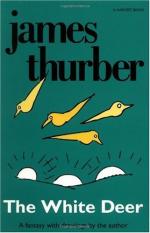|
This section contains 226 words (approx. 1 page at 300 words per page) |

|
This story shows that Thurber cared deeply about fostering love and imagination. He implicitly criticizes those aspects of American culture that undervalue imagination and subvert love.
Commercialism and other forces that distort language for selfish purposes are targets of his scorn. While these social themes pervade the story, they do not dominate it. Jorn's example illustrates that imagination and truthfulness undergird faith and love, while loving faithfulness stimulates the imagination and the desire for truth.
Though Thurber is often described as a misogynist, there is little in this particular tale to support the charge. There are few female characters, and their portraits are not generalized. Princess Rosanore appears mainly as a young woman worthy of Jorn's love. While her character is consistent with the stereotypes of fair maidens in fairy tales, it reveals no special animosity toward women. A gamekeeper's wife is a minor character who...
|
This section contains 226 words (approx. 1 page at 300 words per page) |

|




